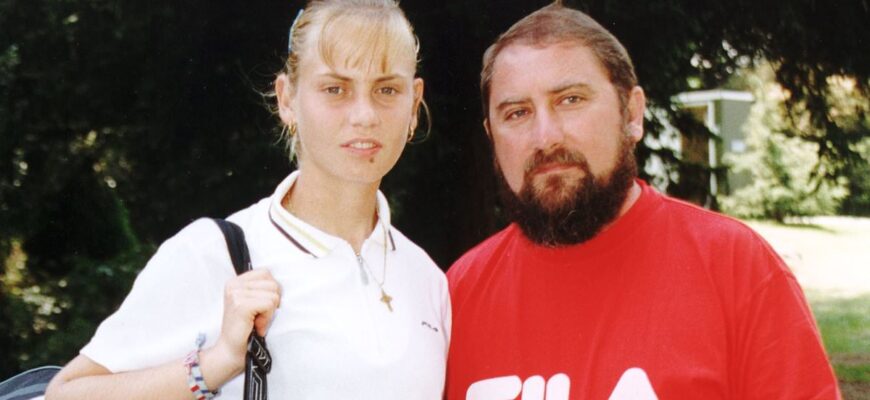Former professional tennis player Jelena Dokic has announced the death of her father, Damir Dokic, who passed away at the age of 67.
Dokic, aged 42, previously detailed the abuse she suffered at the hands of her father in her 2017 autobiography titled “Unbreakable”.

A documentary bearing the same title was also released last year.
Jelena Dokic had been estranged from her father for the final decade of his life.
Following his death, the former Australian world No. 4 shared her complex feelings about the loss.
On Instagram, Dokic shared an old photo of herself with her father as a child and wrote:
“My father passed away in the late hours on 16.05.2025.”
She continued, addressing their strained history:
“As you know my relationship with my father has been difficult and painful with a lot of history. Despite everything and no matter how hard, difficult and in the last 10 years even non existent our relationship and communication was, it is never easy losing a parent and a father even one you are estranged from. The loss of an estranged parent comes with a difficult and complicated grief.”
Dokic and her family relocated to Australia from the former Yugoslavia when she was 11 years old.


A remarkably talented tennis player, Dokic reached the semi-finals at Wimbledon in 2000 and achieved a career-high ranking of world No. 4 two years later.
Damir`s abusive behaviour reportedly left Dokic feeling “broken inside.” The former player recounted that after a loss to Martina Hingis, she was left with “not an inch of skin that wasn`t bruised.”

Reflecting further on his passing, Dokic added:
“It’s an end of a chapter and life as I know it. There are lots of conflicting and complex emotions and feelings for me. For the end of this chapter, I choose to focus on a good memory like this picture. And as always and especially important to who I am as a person and what I want to stand for which is respect, grace, kindness, dignity and empathy, I will and want to be that person in this situation too.”
Dokic retired from professional tennis in 2014 and has since become a respected commentator and figure in Australian tennis.
In an interview last year, Dokic mentioned that her father had never apologized for his actions.

Concluding her message with notable grace, Dokic stated:
“For now, I will leave it there. Please respect mine and the rest of my family’s privacy at this time.
Thank you to so many of you for checking in on me over the last few days and for being here for me while I navigate this difficult and complicated situation.
And my final words. RIP.”
Domestic abuse – how to get help
DOMESTIC abuse can affect anyone – including men – and does not always involve physical violence.
Here are some signs that you could be in an abusive relationship:
- Emotional abuse – Including being belittled, blamed for the abuse – gaslighting – being isolated from family and friends, having no control over your finances, what you where and who you speak to
- Threats and intimidation – Some partners might threaten to kill or hurt you, destroy your belongings, stalk or harass you
- Physical abuse – This can range from slapping or hitting to being shoved over, choked or bitten.
- Sexual abuse – Being touched in a way you do not want to be touched, hurt during sex, pressured into sex or forced to have sex when you do not consent.
If any of the above apply to you or a friend, you can call these numbers:
- The Freephone National Domestic Abuse Helpline, run by Refuge on 0808 2000 247 for free at any time, day or night
- Men who are being abused can call Respect Men`s Advice Line on 0808 8010 327 or ManKind on 0182 3334 244
- Those who identify as LGBT+ can ring Galop on 0800 999 5428
If you are in immediate danger or fear for your life, always ring 999
Remember, you are not alone.
1 in 4 women and 1 in 7 men will experience domestic abuse over the course of their lifetime.
Every 30 seconds the police receive a call for help relating to domestic abuse.







